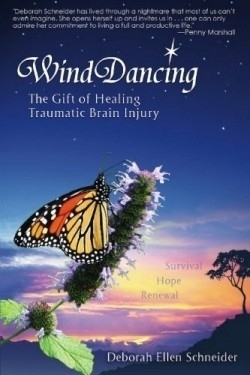Wind Dancing
The Gift of Healing Traumatic Brain Injury
A traumatic brain injury is, in some ways, the cruelest of injuries. A survivor may appear recovered, without physical scars or obvious deficits, while the psychological agony of the trauma continues unseen. Because of this abyss between what the survivor experiences and what their family and caretakers see, support can be hard to come by, and the struggle for real recovery is an epic battle.
Numerous published memoirs about brain injury offer an insider’s view of these challenges. This particular account, while lacking in storytelling finesse, is notable for detailing how the author’s previous life experience both helped and hindered recovery. Deborah Ellen Schneider was an active and competent professional woman and mother when a terrible car accident resulted in a head injury and chronic pain. Her fragile psychological health, already compromised by a difficult childhood, deteriorated further. Then while undergoing physical therapy to improve her functioning, she was sexually abused by a rehabilitation professional—literally adding insult to injury. She vividly recreates the appalling loneliness, memory loss, and cognitive slowdown that tormented her in the early stages of recovery. Eventually, however, determination and spiritual strength allowed her to overcome the wounds of both her childhood and her brain injury, and to bring her abuser to justice.
While Schneider deserves enormous respect and admiration for her struggles and success, such a powerful story requires equally powerful literary skills in order to stand out and appeal to a wide audience, and here it unfortunately falls short. The prose is basically competent but lacks professionalism and suffers from overworked metaphors. For example, she writes, “Our careers skyrocketed as we whirled about Wall Street reaping the benefits and perks of success.” The book moves back and forth between the time of Schneider’s head injury and earlier parts of her life, detailing both successes (her status as a supermom and her dynamic banking career) and difficulties (critical parents, college date rape, unhappy marriages). This technique does help to flesh out her story and show how coping strategies both helped and harmed her later life, but the transitions are sometimes awkward or puzzling. Late in the text, one chapter recalls mounting successes—winning at a horse show, opening a massage therapy practice, and mastering public speaking—but the next chapter is about a subsequent near-attempt at suicide. While this may be an effort to indicate how uneven and fragmented long-term recovery can be, the transition is disconcerting. Stronger sense of a narrative arc and professional editing would have been helpful to achieve cohesion.
Nevertheless, the book’s central message, apparent in the subtitle, is a profound one: a trauma can ultimately become a transformative gift, as it has for this author, if one masters the ability to learn from it.
Disclosure: This article is not an endorsement, but a review. The publisher of this book provided free copies of the book and paid a small fee to have their book reviewed by a professional reviewer. Foreword Reviews and Clarion Reviews make no guarantee that the publisher will receive a positive review. Foreword Magazine, Inc. is disclosing this in accordance with the Federal Trade Commission’s 16 CFR, Part 255.

